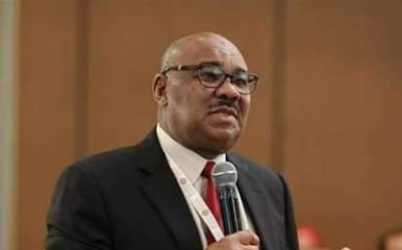Military’s participation behinds U.S. refusal to drop Sudan from terror list: minister
October 1, 2019 (PARIS) – Trump administration wants to ascertain that the civilian government is the true ruler of Sudan before to remove the east African country from the terror list, said Sudan’s economy minister

Hamdok, also, was ignored by President Trump and his senior officials, only he had a meeting with the Under Secretary of State for Political Affairs David Hale to discuss the sanctions on the margins of the 74th UN General Assembly in New York on 23 September. The other officials discussed humanitarian assistance and cooperation on fighting against financing terrorism.
During his visit to Paris, Minister Ibrahim al-Badawi was asked by Sudan Tribune if the U.S. rejection to remove Sudan from the terror blacklist was linked to the military generals who sit alongside civilian officials in Khartoum.
“I didn’t hear that personally from American officials but I know they said wanting to verify first that the civilian government effectively rules the country,” al-Badawi told Sudan Tribune.
The minister added that the U.S. officials also put on the table the other matters related to human rights, freedoms, peace in Sudan and economic reforms.
He seemed not convinced by the reasons advanced by the Trump administration to explain their attitude towards his government.
He said the military do not represent a danger for the Sudanese revolution.
“By taking sides with the revolution, the military establishment has made an appreciable contribution to the revolution, and this has led to averting the country’s slide into civil war,” he stressed.
This position is shared by former President Jimmy Carter who called on President Donald Trump to remove Sudan from its terror list to allow international support for the transitional government.
“Without such a step, Prime Minister Hamdok’s government will remain vulnerable. Peaceful demonstrations calling for democracy toppled former President Omar al-Bashir, but continuing economic deprivation may lead frustrations to boil over once again. Hamdok needs to demonstrate that the civilian government can improve people’s lives,” Carter said.
In the same trend Rebecca Hamilton, an associate professor at American University Washington College of Law, wrote an article published by the Washington Post on Tuesday supporting the cancellation of Sudan’s designation as a state terror.
Hamilton who extensively wrote in the past about Darfur pointed out that the participation of the military commanders in the transitional government “makes everyone uneasy” before to point to Mohamed Hamdan Daglo Hemetti, the commander of the Rapid Support Forces (RSF) who is accused of war crimes in Darfur and other regions.
“But this reality must not lead the international community to hedge, waiting to invest fully in supporting the efforts of the new government until a complete democratic transition seems like a sure bet,” she said.
“The time to pull out all stops in support of the democratic aspirations of the Sudanese people is now,” Hamilton concluded.
Al-Badawi said they are hopeful that the international support for their cause brings the Trump administration to change its mind and delist his country.
“I am optimistic about what happened in the UN General Assembly and the great pressures facing the US administration,” he said.
(ST)
